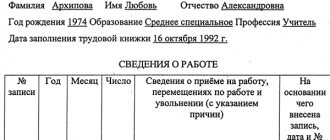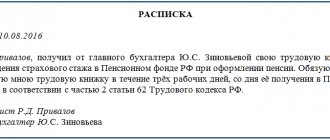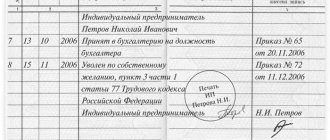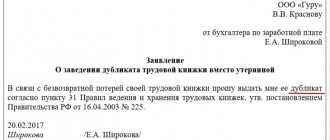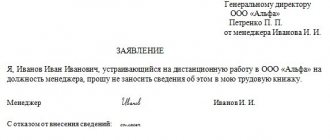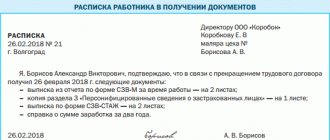Falsifying a work record is a serious offence. Its goals are: obtaining a pension by indicating more length of service, entering a more prestigious job, concealing unpleasant facts that may deprive a person of the opportunity to hold a certain position. Responsibility for forgery lies with both employees and employers, whose responsibilities include checking all documents when employing specialists.
Detection of a counterfeit may entail not just dismissal under an article of the Labor Code of the Russian Federation, but even a fine and, in extreme cases, imprisonment.
What is the purpose of falsifying a work record?
Important! Even if the work book form turns out to be false through no fault of the employee, such a document will not have legal force.
An employee may have a fake work book even because he simply did not know what a document that meets legal requirements should look like. However, most often it is unscrupulous applicants who try to mislead a potential employer. It also happens that the previous employer is at fault because he bought a blank form at a regular kiosk or entered the information inappropriately.
If we talk specifically about attackers, they can pursue various goals by handing over a fake work book to the employer:
- concealment of unpleasant facts (for example, at a previous place of work, an employee violated labor discipline, made a serious mistake or committed an offense, which was recorded in the work book, and now does not want to lose the opportunity to get a similar position);
- new employment (for example, an employee reported in a fake work book that he has work experience and higher qualifications, thereby gaining a chance for employment and an advantageous position in comparison with other candidates);
- registration of a pension benefit (the work book indicates a long insurance period, and therefore a higher pension is assigned).
Arbitrage practice
The Nizhnekamsk City Court of the Republic of Tatarstan considered a claim filed by a legal entity against its chief accountant. The employer accused her of several violations at once, namely theft of financial resources and forgery of a work record book.
When the fact of theft of funds was discovered, the organization's management began to thoroughly check all the personal documentation of the chief accountant, as a result of which it was discovered that the work book provided during employment was a fake. They were able to discover this only after they contacted the previous employer with a request about the citizen’s work activity. At the same time, the document form itself was drawn up accordingly and had all the signatures and seals. It turned out that the culprit had previously filled out a blank book with her own hand, entering into it all the information she needed.
During the trial, the defendant did not deny the fact of forgery and fully admitted her guilt. The judge sentenced her for this offense in the form of restriction of freedom for a period of 1 year under Article 327 of the Criminal Code of the Russian Federation.
Verdict of April 5, 2021 in case No. 1-232/2016
Practice of application of Art. 327 of the Criminal Code of the Russian Federation for falsifying a work record book
Qualification of the actions of a person who falsifies a work record book under Art. 327 of the Criminal Code of the Russian Federation, is present in the criminal practice of a number of regional courts.
For example, the Novosergievsky District Court of the Orenburg Region found K. guilty of committing a crime under Part 3 of Art. 327 of the Criminal Code of the Russian Federation. The convict submitted to the agriculture department of the district administration a false employment contract dated April 1, 2008, signed by the chief accountant and general director of Peredovik LLC (the investigation later established that the general director’s signature was forged). In addition, K. presented a false work book of a collective farmer in her name, containing an entry made by the chief accountant of Peredovik LLC that K. was hired as a cook at the LLC.
K. submitted these documents in order to receive a subsidy for the purchase of housing, which was allocated to employees of agricultural enterprises. In accordance with Decrees of the Government of the Russian Federation dated December 3, 2002 No. 858, dated March 5, 2008 No. 144, a prerequisite for participation in the program was the presence of a permanent place of work at an agricultural enterprise with a person with whom an employment contract was concluded for a period of at least 5 years (case No. 1-161/2010).
Some criminal law experts believe that this practice should be expanded; in particular, they refer to the fact that forgery of documents that are similar in essence - medical records of employees and entries in them - is also qualified under Art. 327 of the Criminal Code of the Russian Federation.
How do citizens falsify work records?
Forgery of a work book can be done in several ways, namely:
- a person can purchase from scammers a fake seal of an existing or non-existent organization;
- you can agree with a commercial company that is periodically transforming to have a seal put on it;
- it is possible to make a false entry in the work book;
- you can replace a legally issued work book;
- some replace several sheets of a document;
- False entries are often made (most often the employer enters information about an employee who does not actually work for the company).
conclusions
Responsibility for using a fake work book rests with both the employer and the employee himself. It provides for fines and punishment in accordance with the Criminal Code of the Russian Federation, up to imprisonment.
Attention! If an employer discovers a counterfeit form, he is obliged to report it to law enforcement agencies. Based on the degree of guilt of the employee, a punishment will be imposed on him, or, if he is not guilty, the employer will have to issue a new document.
Sources
- https://KadrovyhDel.ru/trudovaya/knizhka-poddelka-otvetstvennost.html
- https://oaosvrc.ru/drugoe/kak-banki-proveryayut-trudovuyu-knizhku.html
- https://trudinsp.ru/otvetstvennost-za-poddelku-trudovoj-knizhki.html
- https://trudopravo.ru/narusheniya-i-vzyskaniya/poddelka-trudovoj-knizhki-otvetstvennost.html
- https://ugolovnyi-expert.com/poddelka-trudovoj-knizhki-otvetstvennost/
- https://buhproffi.ru/kadry/poddelka-trudovoy-knizhki-kakaya-otvetstvennost.html
- https://assistentus.ru/trudovaya-knizhka/otvetstvenost-za-poddelku/
- https://hr-portal.ru/article/trudovaya-knizhka-chem-opasny-lipovye-zapisi-dlya-stazha
- https://naim.guru/trudovaya-knijka/proverka.html
- https://tvoeip.ru/kadry/trudovaya/otvetstvennost-za-poddelku
- https://rabotniky.com/poddelka-trudovoj-knizhki/
[collapse]
Forgery of a work record: what the law says
Important! If the employer, after he hired a new employee, discovered that the work book was fake, and the employee quit before the circumstances were clarified, he is considered guilty of forging the document.
According to current legislation, an employer who certified a fake work book must pay a fine. However, if he is able to prove his non-involvement in the case (after all, the law does not oblige employers to check the authenticity of the documents submitted by the employee), the court will probably not oblige him to bear financial responsibility.
With an employee who handed over a false work book to the employer, the law allows the employment contract to be terminated, but it is necessary to prove his guilt. Because if a fake book was issued by a previous employer, the employee needs to issue a new document, help in collecting certificates from previous places of work and be allowed to continue working.
| Employee Responsibility | Employer's liability |
| Mandatory forced labor lasting up to 240 hours; arrest for a period of 6 months; executive works for a period of up to 2 years; imprisonment for 2 years. | A fine of up to 200 current minimum wages (after an inspection, if fraud, production of counterfeit books, or forgery is discovered). |
Work on someone else's technical code
If the employer has no fear of the law and hopes that it will pass, he can attempt such altruism. But what is its meaning? For the employer himself, if he is not personally interested in helping this person, this can bring nothing but problems in the future.
Unfortunately, often acting out of pity rather than common sense , those in authority become victims of their own shortsightedness.
Firstly , there is no guarantee that several years after the service is provided, the employee will not come to the employer and demand that he establish work experience, which will be quite useful for calculating a pension.
Even if he does not succeed, the employer will suffer many unpleasant moments in court, as well as during inspections, which in this case he will not be able to avoid.
Secondly , he cannot know with certainty the origin and history of the labor force.
There are known cases when personnel officers hired workers using someone else’s employment contract, and it was later discovered that its owner was already dead.
Thirdly , an ill-wisher, having learned about such violations, can not only poison your professional life, but also charge you with criminal liability for forgery. It will be more than difficult to challenge this fact.
Forgery of a work record: how to recognize a fake document
Important! The employer should pay attention to work records, since it is much better to recognize a false document from the very beginning than to later prove non-involvement and bear financial responsibility.
You should pay attention to the following things that indicate that the document is not genuine:
- compositional or mechanical traces of counterfeit are visible;
- there are logical contradictions in the records;
- a non-standard font was used;
- there are spelling errors;
- the color of the forms is different;
- crossed-outs, blots, and corrections are found that are not permitted by current labor legislation;
- no seal.
| Document type and size | There are 3 versions of the work book - a sample of 1938, 1974 and 2003:
|
| Printing house | On the final page is the name of the organization that published the book. On a document from 1974, “Gosznak 1974” is put (sometimes the language of the republic is also indicated), and on the TC of 2003 there should be a sign “MPF Gosznak 2003”. |
| Work book form | Material – cardboard (old books), vinyl or calico; image of the coat of arms of the Russian Federation or the USSR; pages are unlinked; There is a cover page with information about the employee. |
| Sheet numbering | If the page numbering of the document is incorrect, it means that the sheets have been pulled out. If some pages are different in number color, font or color, then the pages have been replaced with others. |
| Series and number | The 1974 document contains a single red number on ten pages: 1, 5, 9, 13, 17, 21, 25, 29, 33, 37. In the 2003 book, numbers are written in black ink on 11 pages: 1, 3, 9, 15, 19, 23, 27, 31, 33, 37, 39. The series must match the year the document was issued (see the following table). |
| Watermark | The 1977 example has a wavy line watermark on all but the outer 2 pages. The 2003 sample has the “TK” watermark in various colors and a fine mesh. |
| Identifiers | Depends on the year in which the documents were issued. It is enough to compare 2 books of the same type to notice that the difference in the identifier lies only in the different dates of creation of the document. |
How to check a document series:
| A series of documents | Year of issue |
| AT-I | 1974-1976 |
| AT-II | 1977-1979 |
| AT-III | 1980-1982 |
| AT-IV | 1984-1985 |
| AT-V | 1986-1989 |
| AT-VI | 1990-1992 |
| AT-VII | 1993-1997 |
| AT-VIII | 1997-2000 |
| AT-IX | 2001-2003 |
| AT-X | 2003 |
| TK | 2004-2005 |
| TK-I | 2006-2007 |
| TK-II | 2008-2009 |
| TK-III | 2010 |
See how to find your serial number, watermark, and other markings ⇒ here.
Material liability
The employer, upon discovering the fact that he was given a false work book during employment, must take the following actions:
- Find out whether the employee knows that the work book is fake:
- if so, then this must be reported to law enforcement agencies, the prosecutor's office, Rostrud (an employee can only be dismissed by a court decision after proof of guilt, if he has already signed an employment contract);
- if not, the previous employer should correct the records and the current manager should issue a new document.
- Prevent the production of a duplicate (since the original work book contains inaccurate information).
Follow the link to view ⇒ A sample employee application for the issuance of a new work book.
Question No. 1: How to issue a new work book if it turns out that the employee has a fake document issued to him by his previous employer?
Answer: First of all, it is necessary to require the previous employer to correct the entry in the Labor Code to a reliable one. After this, a new book can be issued as soon as the employee who is innocent of falsifying the document writes a corresponding application addressed to the new employer.
Such a forgery, discovered by the boss, should be sent to the investigative authorities for subsequent investigations and appropriate measures. The situation can be resolved by purchasing a new book and collecting documents confirming work activity at previous places of work. This provision is described in Article of the Labor Code No. 65, paragraph 33.
If the fake was discovered after employment, then such a work book is also subject to change. Changing a fake work book is based on Article No. 65 of the Labor Code of the Russian Federation. So, a new document is issued in its place.
The employee is required to write a statement indicating that the form of the current work record book does not correspond to the established form. Based on the application, the employee will be issued a new work book. If it is possible to prove the non-involvement of the accused employee, and it turns out that the first employer used a fake form, and the entry in it is reliable, then the employee can be employed, and responsibility for falsifying the work record is removed.
If, after identifying a falsified work record book, an employee is dismissed without explanation and without investigation, then this is considered illegal and is punishable by law.
You can forge a work book in the same way as a passport - by pasting over photos, making false entries that do not correspond to reality, deliberately changing entries and using fake stamps, etc.
Criminal liability falls on the person who presented such a book, as well as an accomplice, who is considered to be the person who produced and handed over the counterfeit book to the owner. Forgery of a work record book carries the same punishment as for forgery of a passport and criminal liability. If an unscrupulous employee is hired with a fake work book, which may result in damage to the employer’s activities and the organization’s reputation, responsibility falls on the person who made the decision to hire this employee. Therefore, it is so important to check the entries in the work book for compliance with reality.
If the employer has discovered a fictitious entry in the work book, it is necessary to first find out whether the employee himself knows about it or not. Based on his answer, it is necessary to take action - reissue the document or inform law enforcement agencies.
If evidence is received that the employee himself made an incorrect entry in the work book, or he modified an existing entry in some way, then the employer must submit an application to law enforcement agencies.
An investigation into the incident must take place, after which the court must make a decision on whether the employee is guilty or not. This operation can be carried out by the Investigative Committee. If an entry in the work book is falsified, liability arises in accordance with the Criminal Code of the Russian Federation.
Important! Dismissal cannot be made until the investigation is completed and the employee’s guilt is established. Otherwise, he has the right to be reinstated at his place of work through the court.
The employer's actions depend on the moment at which the forgery was detected.
If this event occurred when the employee was hired by the company, and the investigation showed that he did not know that the document was fictitious (for example, a fake form was used), and all the entries made correspond to reality, then this fact cannot interfere with employment. However, the employee needs to collect certificates from previous places of work and use them to draw up a new document.
If the fact of using a counterfeit book is discovered after registration for a job, then it is also subject to reissue. In this case, not a duplicate is drawn up, but the original document, since it is initially missing.
Attention! The employee must submit an application with a request to draw up and issue a new work book due to the fact that the form is of an old, unspecified form.
An employer is always held accountable if he employs an employee with a false document. It does not matter whether this was done intentionally or by accident. By law, an organization is required to check the documents of its employee before hiring him.
If an organization is negligent in checking documents, it may be subject to an administrative fine of 1-2 thousand rubles. If a company takes part in the preparation of a fake labor document or makes false entries, then the guilty person may be brought to criminal liability.
Providing a false work record book by an employee is a violation of knowingly providing false information during employment. If the employee has already been hired, he can be fired in accordance with Art. 81 Labor Code of the Russian Federation. However, the basis for this must be a court decision that establishes the employee’s guilt.
If convicted, the perpetrator not only loses his job, but also criminal or administrative liability is imposed on him. If a citizen simply used a fake work book and did not know about it, then a fine of up to 80 thousand rubles may be imposed on him.
However, liability may also be imposed in accordance with Part 3 of Art. 327 of the Criminal Code of the Russian Federation - up to 2 years of forced labor. The court takes the following point of view on this issue - even if the employee himself did not create this counterfeit, thanks to it he carried out work, received benefits, etc. - that is, he had material benefits.
Attention! If the court finds that the employee is not guilty of falsifying a document, he can keep his job. However, the employer must issue him a new original document based on certificates from all previous places of work.
Disciplinary action for improper maintenance of work records constitutes the employee’s responsibility for improper performance of work duties.
Disciplinary punishment can only be applied to the employee who is responsible for filling out work books. To do this, you must have the following documents:
- There must be an order or other document that confirms that the performance of these duties is assigned to a specific employee. The document must contain the signature of the responsible person as confirmation that he is familiar with it.
- All job responsibilities must be specified in the job description. Only according to them can it be possible to identify improper performance or non-performance of work functions.
- A document is required that confirms that the violation of the maintenance of work records occurred solely through the fault of the employee.
All penalties must be carried out in accordance with the law.
The labor responsibilities of an authorized employee include issuing, maintaining, storing and recording work books, as well as inserts in them. In case of violation of correct actions at each of these stages, disciplinary action can be taken against the employee.
Main types of disciplinary measures:
- oral remark}
- rebuke}
- dismissal.
The employer decides what kind of penalty to apply to an employee who has violated his duties. It depends on the circumstances and the offense itself, that is, the degree of its severity. As a rule, the first violation of the rules for maintaining work records is not grounds for dismissal. After the first reprimand or penalty, the employee’s authority may be removed. An employee may face dismissal if there have been repeated violations on his part.
The type and extent of the violation are established by the employer. An order must be drawn up that specifies all the reasons for the penalty. The employee must be familiarized with it within three days, as evidenced by his signature on the order. If for some reason the violator refuses to issue a visa, then it is necessary to draw up an appropriate act.
The employer must remember that if discrepancies are discovered, penalties must be applied immediately, and there is no need to wait for the injured employee to file a claim in court. In case of inspection, timely disciplinary action against the employee will benefit the organization.
In a situation where an employee does not agree with a reprimand or remark, he can appeal to:
- labor inspectorate}
- labor dispute commissions}
- bodies that deal with individual labor disputes}
- The last option is court.
The appeal period is no more than three months from the date of punishment. But if the deadline was missed for reasons that have an objective justification, then it can be extended.
To challenge a dismissal, a claim must be filed in court no later than one month from the date on which the employee was familiarized with the dismissal order. This period may also be extended for valid reasons.
As a rule, if the employer cannot reasonably explain the legality of the penalties, the decision will be made in favor of the employee.
Material penalty implies liability for losses that were caused by the guilty party to the employee as a result of violation of his labor duties.
Financial liability may arise for the following acts:
- The employer did not issue the work book to the employee on time.
Common mistakes
Error: The employee whose employment record was found to be fraudulent was immediately fired.
Comment: An employee can be fired for falsifying a work record book only after his guilt has been proven in court.
Error: The employer produced a duplicate work record book, which turned out to be fake when the employee was hired.
Comment: A duplicate cannot be issued, since the original work book contained unreliable entries.

